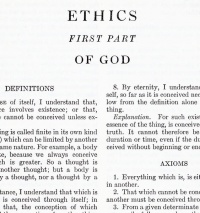Ethics
From The Art and Popular Culture Encyclopedia
(Difference between revisions)
| Revision as of 19:28, 25 April 2013 Jahsonic (Talk | contribs) ← Previous diff |
Revision as of 19:29, 25 April 2013 Jahsonic (Talk | contribs) Next diff → |
||
| Line 1: | Line 1: | ||
| [[Image:Ethics by Spinoza.jpg|Spinoza's|thumb|right|200px|By virtue of his [[magnum opus]], the posthumous ''[[Ethics (book)|Ethics]]'', [[Spinoza]] is considered one of [[Western philosophy|Western philosophy's]] definitive ethicists.]] | [[Image:Ethics by Spinoza.jpg|Spinoza's|thumb|right|200px|By virtue of his [[magnum opus]], the posthumous ''[[Ethics (book)|Ethics]]'', [[Spinoza]] is considered one of [[Western philosophy|Western philosophy's]] definitive ethicists.]] | ||
| {{Template}} | {{Template}} | ||
| - | '''Ethics''' (from the [[Ancient Greek]] ''ēthikos'', the [[adjective]] of ''ēthos'' "custom, habit"), a major branch of philosophy, is the study of [[Value theory|value]]s and [[Custom (law)|custom]]s of a person or group. It covers the [[Philosophical analysis|analysis]] and employment of [[concept]]s such as [[right]] and [[wrong]], [[good and evil]], and [[moral responsibility|responsibility]]. It is divided into three primary areas: ''meta-ethics'' (the study of the concept of ethics), ''normative ethics'' (the study of how to determine ethical values), and ''applied ethics'' (the study of the use of ethical values). | + | |
| + | '''Ethics''', also known as '''moral philosophy''', is a branch of [[philosophy]] that involves systematizing, defending, and recommending concepts of right and wrong [[action (philosophy)|conduct]]. The term comes from the Greek word [[ethos]], which means "character". Ethics is a complement to [[Aesthetics]] in the philosophy field of [[Axiology]]. In philosophy, ethics studies the moral behavior in humans, and how one should act. | ||
| + | Ethics may be divided into four major areas of study: | ||
| + | |||
| + | * [[Meta-ethics]], about the theoretical meaning and reference of moral propositions and how their [[truth value]]s (if any) may be determined; | ||
| + | * [[Normative ethics]], about the practical means of determining a moral course of action; | ||
| + | * [[Applied ethics]], about how moral outcomes can be achieved in specific situations; | ||
| + | * [[Descriptive ethics]], also known as comparative ethics, is the study of people's beliefs about morality; | ||
| + | |||
| + | Ethics seeks to resolve questions dealing with human morality—concepts such as [[good and evil]], [[right and wrong]], [[virtue]] and [[vice]], [[justice]] and [[crime]]. | ||
| + | |||
| ==See also== | ==See also== | ||
| * [[Altruism (ethics)]] | * [[Altruism (ethics)]] | ||
Revision as of 19:29, 25 April 2013

By virtue of his magnum opus, the posthumous Ethics, Spinoza is considered one of Western philosophy's definitive ethicists.
|
Related e |
|
Featured: |
Ethics, also known as moral philosophy, is a branch of philosophy that involves systematizing, defending, and recommending concepts of right and wrong conduct. The term comes from the Greek word ethos, which means "character". Ethics is a complement to Aesthetics in the philosophy field of Axiology. In philosophy, ethics studies the moral behavior in humans, and how one should act. Ethics may be divided into four major areas of study:
- Meta-ethics, about the theoretical meaning and reference of moral propositions and how their truth values (if any) may be determined;
- Normative ethics, about the practical means of determining a moral course of action;
- Applied ethics, about how moral outcomes can be achieved in specific situations;
- Descriptive ethics, also known as comparative ethics, is the study of people's beliefs about morality;
Ethics seeks to resolve questions dealing with human morality—concepts such as good and evil, right and wrong, virtue and vice, justice and crime.
See also
- Altruism (ethics)
- Bioethics
- Deontological ethics
- Ethical egoism
- Ethical relativism
- Ethical skepticism
- Ethical subjectivism
- Ethics in religion
- Fallibilism
- Foucault/Habermas debate
- Hedonism
- Journalism ethics
- Legal ethics
- List of ethics topics
- Medical ethics
- Moral absolutism
- Moral nihilism
- Moral syncretism
- Morality
- Normative ethics
Unless indicated otherwise, the text in this article is either based on Wikipedia article "Ethics" or another language Wikipedia page thereof used under the terms of the GNU Free Documentation License; or on research by Jahsonic and friends. See Art and Popular Culture's copyright notice.

